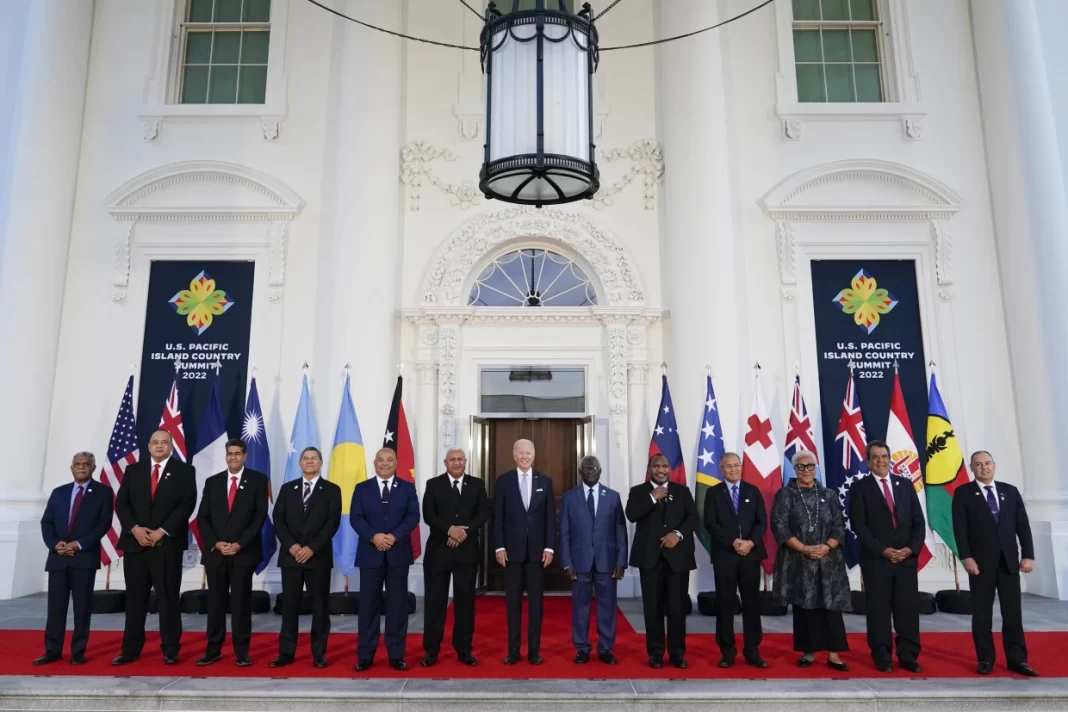Geopolitical experts are warning that the Pacific isn’t a priority for the United States and that time is running out for them to be considered a credible partner.
Professor Steven Ratuva, the Pro-Vice Chancellor, Pacific at Canterbury University, said so much has been made about the U.S support for development but its contribution is “virtually nil in many countries in the Pacific”.
His comment comes as the U.S has failed to provide funds under the Compact of Free Association (COFA) agreements with Palau, the Federated State of Micronesia and the Marshall Islands, as well as funding pledged by President Joe Biden at two Pacific Forum summits held in Washington DC.
“Washington is not really interested in the Pacific. Its priority is really in the Middle East (and) in Europe at the moment – and it (funding) has not even been passed in the Congress – so it’s way down the hierarchy.”
Last year negotiations for the new COFA agreements had concluded, which would give the US exclusive military access and provide the three nations US$7.1 billion over the next 20 years.
But it needed to be passed by what some describe as the most dysfunctional and least productive US Congress in 50 years. And that’s where the funding has stalled.
In a joint letter to Senate leaders early last month, presidents of the three COFA Pacific nations, warned the funding delay had “generated uncertainty among our peoples” and “resulted in undesirable opportunities for economic exploitation by competitive political actors in the Pacific.”
It was a clear reference to the growing interests of China in the region.
Even the New Zealand and Australian Ambassadors to the U.S wrote a joint letter on 22 February 2024 to Senate and House leaders, urging that the timely passage of the COFA Amendments Act was “imperative to uphold our mutual interests in a vital region for our three countries”.
The Ambassadors said that if the economic assistance continued to be delayed, the three Pacific nations would face economic, fiscal and strategic uncertainty and result in “significant pressure to look for sources of funding that they believe are more reliable”.
“As your closest friends in the Pacific, we are committed to seeing the United States remains engaged and active in this critically important region,” the letter said.
About US$1.2 million of funds pledged by President Biden at two Pacific Forum Summits has also been held up in the chaotic Congress.
Speaking with Pacific Mornings on 531pi Professor Ratuva, who is also the Director of the Macmillan Brown Centre for Pacific Studies, doubted that Pacific nations would see the funds promised at the Washington D.C. summits “anytime soon”.
“It’s one of those big power, small power relationships, which big powers use as a way of fulfilling its bigger strategic interests but leaving the smaller states, waiting and in fact powerless and disempowered in the process,” he said.
Professor Ratuva believes the COFA funding will eventually materialise because the U.S needs access to the military bases for its own strategic purposes.
But he questioned whether the U.S was seriously concerned about the education, health or general development of the COFA nations, as it was only interested in what would serve its own “global security interest”.
Dr Anna Powles, Associate Professor in Security Studies at Massey University, in a recent interview on Pacific Mornings, also questioned whether the U.S was seriously committed to the Pacific.
“I think that the window of opportunity for the United States to demonstrate that it is a credible, consistent partner to the Pacific is closing, particularly with the upcoming elections, where we may see Donald Trump back in the White House.
“And it’s not likely that the Pacific is going to be top of his priority list.”
She said the funds pledged during the summits wasn’t a lot in any case, as much of it had already been promised, most notably the US$600 million for the Forum Fisheries Agency over 10 years.
“We see this kind of cobbled together, sort of patchwork of commitments, but nothing really that significant.”
She said the level of consistency of engagement by the U.S should have people concerned and that the “rhetoric doesn’t quite match the reality on the ground”.














